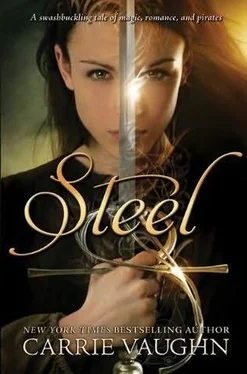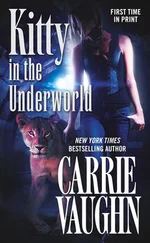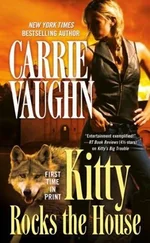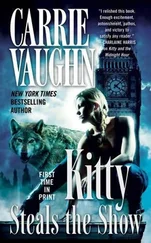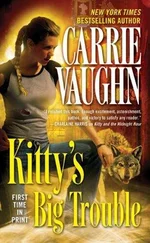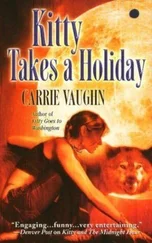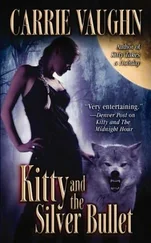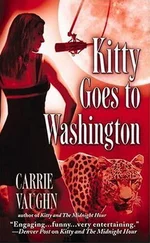If this was a joke, she was the only one not laughing. They were teasing her, and she couldn’t do anything about it. Anger made her straighten and look Captain Cooper in the eye. The woman might not have been so tall; she didn’t even look strong. But Jill wouldn’t want to fight her. Cooper wouldn’t fight fair. In the captain’s mind—and in the minds of the crew—by signing that page she’d agreed to obey the captain, no arguments. She wondered if pirates really did make people walk the plank. This time, there might not be anyone to fish her out.
“Aye, sir,” she said softly, offering the rapier, handle first, to Cooper. The woman’s smile was thin, satisfied.
Cooper turned over the wheel and shouted, “Henry! Show the new recruit how we scrub decks!”
“Aye!” He’d been coiling rope with another sailor by the side of the ship, but he looked gleeful when Cooper called to him.
Henry, the boy she’d fought. Who might have beaten her if the captain hadn’t stopped the duel. She didn’t want to face him. Cooper pulled him aside, and Jill caught a few whispered words: “Make sure Jenks and his crowd keep away from her.”
“Aye,” he murmured back. Jill pretended not to hear, but she worried.
Cooper straightened and called, “Off you go. Welcome to the Diana .”
Jill didn’t feel very welcome. She’d play along just until she could find a way to get out of here. Somehow. But it was hard to escape from a boat in the middle of the ocean. Land was still in sight—a rough band of foliage on the horizon. But she didn’t know if it was the Bahamas, and she didn’t think she could swim so far.
Then Henry was standing before her holding a brick-size rock, like a pumice stone, and a bucket. “Don’t take it personal. The newest bloke always scrubs the decks.” He held the stone and bucket out to her.
The deck, which was probably only sixty feet long and twenty feet wide, suddenly looked as large as a football field. “The whole thing?” she said. “With this?”
“Now you can guess why it’s always the job of the new bloke.” He was enjoying this.
“But…I mean why bother? People walk around on this all day. It’ll never stay clean. Why bother scrubbing it?”
“You don’t know? Really?” She looked blankly at him. “It’s the damp, the salt air, the mildew. It’ll rot the wood if we don’t keep it scrubbed. Wait’ll we have to careen her and scrub the rot off the hull. There’s a bloody dire job.”
Stone in hand, Jill knelt and dreaded starting because it would take forever. She started in one corner in the back and ran the stone over the wood, polishing it. The deck was pale and smooth from all the previous scrubbing.
Henry watched, sitting up on the side, leaning against a length of rigging, whittling on a piece of wood with a penknife, dropping shavings on her nice clean deck. Teasing her.
“Do you have to sit there?” she said.
“I need to keep a close eye on you. Make sure you don’t miss an inch. Try scrubbing in circles, it works better.”
So she did, shifting sideways, until she’d reached the other side of the ship. Then she worked her way back. She could feel Henry watching her, an itching down her spine. He seemed to be far too pleased, watching her working on her hands and knees. Like he was gloating.
“I gotta ask,” he said, putting the knife away. “Where’d you learn to fight so pretty? Like a picture in a book, you are. That’s no use in a real fight.”
A real fight—that tournament was real fighting. At least, she’d thought so then. It was all this that wasn’t real. She paused a moment to glare at him. Just like she thought, he was teasing, and he didn’t let up. “I’m just trying to figure out what your story is. Most of us have pretty good stories, but you, finding you alive in that wreckage—seems like it ought to be right impressive.”
“I don’t know what happened,” she said, her voice flat.
“Don’t be sore. I’m just trying to be friendly,” he said.
She glared again. She wasn’t in the mood.
“Don’t you want to know how I ended up here?”
“Not really.”
“I was a lad on a merchant ship that the Diana captured. I got much the same offer you did, sign on with the crew here or be set adrift. But I didn’t have to think it over. My old captain was a mean one. A right bastard. Held back rations to raise profits, and us at the low end got shillings for our troubles, never mind shares. I tell you true, this place is a world better than where I came from. I wouldn’t trade it.”
In spite of herself, she’d stopped scrubbing to listen to him, trying to imagine the world he might have come from. And she couldn’t. “I don’t belong here at all,” she said.
“Then you’re not one of those girls dresses up as a lad and goes looking for adventure?”
“No. I keep telling you, it was an accident.”
“You look it, with your hair cut. It’s what we all thought.”
“I—I’m not sure what happened.”
“Lost your memory, then?”
“Yeah, I guess I did,” she murmured. It seemed as good an explanation as any.
By the end of the day, the ship had lost sight of land. No chance of swimming for it now.
She must have worked ten straight hours that day. Henry was called away on another chore, something to do with the sails, but Jill couldn’t stop working because someone was always around, climbing rigging, mending sails, keeping lookout, or doing one of the other mysterious jobs on a boat like this. She scrubbed, and her hands and arms grew cramped, her fingers sore and cracked, and the sun beat down on her. She’d never worked so hard and could feel herself getting sunburned, despite the long sleeves and pants. Her nose, ears, and the back of her neck stung.
As they sailed on, the view never changed, and she had no indication that time was passing except for the sun moving overhead.
It was almost at the horizon when Henry returned and took the stone from her, grabbing it right out of her hands. She stared at her empty hands a moment, then looked at him, almost hurt. She wasn’t done yet—at least she didn’t think she was. But she might have gone around the whole deck twice for all she knew.
“Come on then, time for supper,” he said, and gestured her toward the middle of the deck.
She needed a long moment to stand, straightening the kinks out of her back. She’d thought she was in good shape.
The crew, thirty or forty people, gathered in the widest, most open part of the ship and made a rowdy line in front of two men, who carried what looked like a cast iron pot and a small wooden barrel: dinner.
Jill was starving, but she hung back, not wanting to get caught in a brawl. She couldn’t tell if the yelling and jostling was in earnest or in fun. But no fighting broke out among them—just like the articles said.
Abe stood near the men with the food, facing out, supervising. Abe was the quartermaster and almost as important as the captain on a ship like this. He was in charge of supplies, rations, and treasure, and of ensuring that everyone got an equal share and that no one tried to take more behind the others’ backs. This position was, like the captain’s, elected, and the quartermaster was the one everyone trusted. When he saw Jill, he smiled, but like with Henry she couldn’t tell if he was laughing at her or honestly trying to be friendly. After all his talk, Henry hadn’t seemed to hold the grudge against her. She looked at every member of the crew, searching for the hostility they’d shown when she first came on board. Mostly, they ignored her.
At sunset, lanterns were hung about the deck, from hooks on the masts and railings, and the cook—a thin, bearded man who didn’t look anywhere near clean enough to be serving food—distributed supper under Abe’s watchful gaze. Henry found Jill a tin cup and a dented metal bowl. She waited at the end of the line because she didn’t want anyone staring over her shoulder. And no one could give her a hard time if she put herself at the end. She wanted to hide, mouselike. But she also wanted to eat.
Читать дальше
